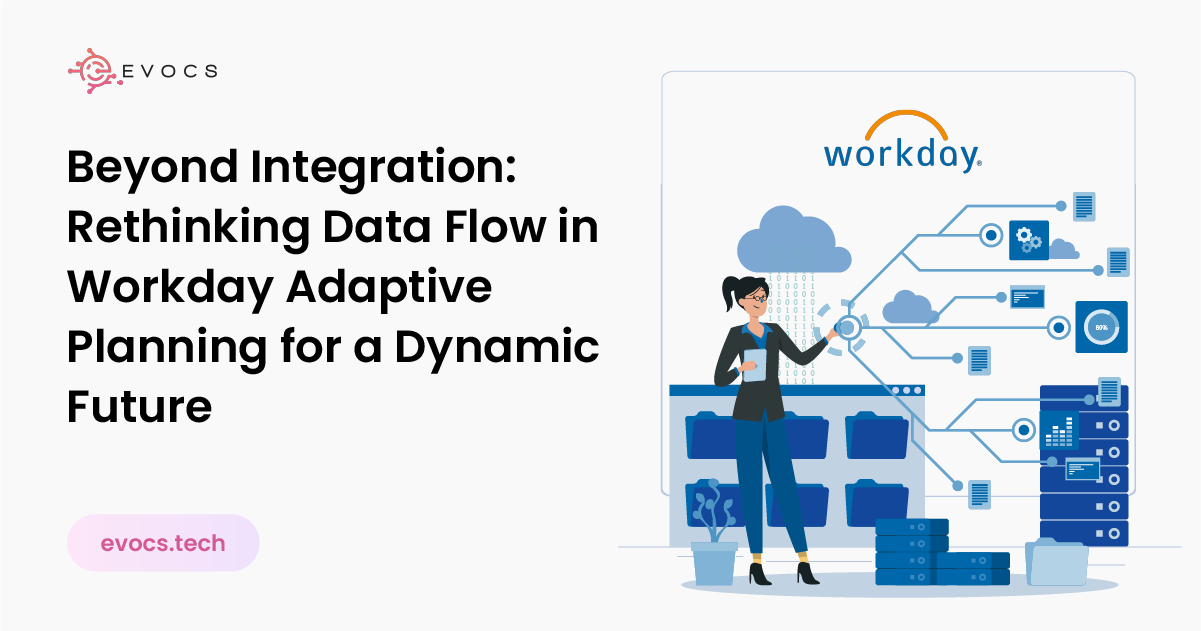Beyond Integration: Rethinking Data Flow in Workday Adaptive Planning for a Dynamic Future
Most organizations primarily concentrate on data integration between operational systems which transfer data from ERP, CRM, HR and Workday Adaptive Planning. The actual obstacle surpasses data transport because organizations must understand how their data structure affects continuous decision making and data utilization. Financial planning has been treated exclusively as a reporting function by companies who focus only on static forecasts and periodic updates throughout the years. The innovative leaders in organizations recognize data flow demands more than system connectivity because it requires flexible systems that support quick actions. This article introduces an innovative perspective for data flow management in Workday Adaptive Planning through the lens of smart arrangement methods alongside instant decision networks and data reliability systems while omitting discussion of standard pipelines and automation concepts. From Data Pipelines to Dynamic Decision Ecosystems Organizations transfer source system data into Workday Adaptive Planning where modeling, forecasting and reporting takes place. Moving information from source systems into adaptive planning represents basic requirements however it fails to produce optimal results in the contemporary business world. The New Approach: Decision Ecosystems Such a system allows Workday Adaptive Planning to receive data which develops while connecting with other elements to create dynamic responses to updates. In a decision ecosystem: The data system continuously receives fresh inputs from operations, finance, and external market trends through its feed systems. The analysis done by AI and machine learning models updates assumptions through pattern recognition instead of requiring human-created input alterations. Scenario models gain perpetual feedback loops during real-time operations instead of remaining stationary as inactive end products. The fundamental transformation of Workday Adaptive Planning converts the system from storage of planning data into a modern intelligence platform that enables businesses to take action on emerging risks and opportunities. Breaking the Myth: More Data does not equal Better Planning Companies generally believe that using more integrated data in their forecasting process produces superior forecast results. The reality shows that numerous finance teams face a deluge of data which results in these three issues: Slow decision-making due to complex, unnecessary data points. The product of multiple conflicting versions of organizational data becomes a critical issue. Planners take extended periods to verify numerical data rather than focusing on crucial business decisions. The Solution: Precision Data Flow Businesses should concentrate on precision data flow instead of collecting every available dataset because this emphasis works as follows: A determination of data elements which influence choices and removal of non-essential information. Models update automatically by dynamic data filters that respond to meaningful changes in the data as an alternative to importing complete datasets. The focus must be on collecting high-quality validated inputs over gathering all possible metrics. Organizations become more agile yet perform planning operations with accelerated speed by implementing noise reduction policies and relevant data management systems. Data Trust: The Missing Piece in Financial Planning Data flow is meaningless if stakeholders don’t trust the numbers. In many organizations, conflicting reports lead to delayed approvals, revisions, and second-guessing. How to Build Trust in Workday Adaptive Planning Data Establish a Single Source of Truth: Rather than relying on spreadsheets and parallel reporting systems, align all planning activities within Workday Adaptive Planning. Implement Real-Time Data Reconciliation: Ensure that incoming data is automatically validated, cross-checked, and reconciled before it enters planning models. Use Transparent Audit Trails: Allow stakeholders to track data sources, changes, and approvals to increase confidence in forecasts. Without data trust, even the best-integrated systems will fail to drive real business impact. Redefining Real-Time Planning with Proactive Data Flow Many organizations talk about real-time planning, but few actually achieve it. The key issue? Most data flows are reactive—they wait for inputs before updating models. The Future: Proactive Data Flow Other benefits of proactive data flow, which replace the inherent delays of quarterly updates or manual refreshes, include: Risk management: Insights (such as a company’s revenue drop or a project going over budget) that provide early warnings before an issue materializes. Rolling forecasts: Workday Adaptive Planning changes the different assumptions in a continuous flow related to the market. Real-time data sync: Different from manual upload of data into the system, systems change the main planning parameters once new data arrives. The concept of a proactive data flow makes Workday Adaptive Planning work more as a forecasting tool as opposed to just a reporting tool. Conclusion: Moving Beyond Traditional Thinking Any organization that still regards Workday Adaptive Planning as just a planning software is missing the full capability of the software. Therefore by extending the kind of conversation from data integration, to decision ecosystems, precision data flow, and successful planning, organizations can: Make faster, more confident decisions. Lead to reduction of the amount of time used in the validation of data. Utilize financial planning as a competitive business strategy. Data movement is not just mere manipulation of numbers, but it offers enablement of improved decisions. Strategic management of fluid, responsive, and trusted data flow in an organization will define the next generation of business planning. Final Thought: First, it is time to stop considering Workday Adaptive Planning as only a planning tool and start seeing the system as an operating decision intelligence. The organizations which have adopted this new perspective will benefit from it by becoming more competitive in the current world dominated by data. Want to empower your business without relying on Workday Adaptive Planning? Click here!


